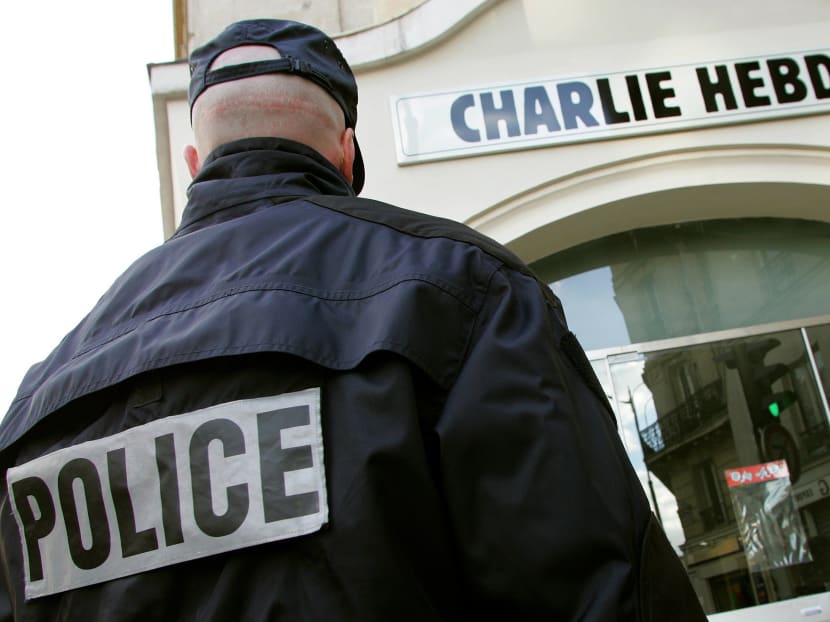Ban of Red Lines book was not due to political content but religiously offensive images: Josephine Teo
SINGAPORE — The decision to ban the book Red Lines: Political Cartoons and the Struggle Against Censorship was not because of its political content and was solely based on it containing religiously offensive images, Mrs Josephine Teo said in Parliament on Wednesday (Jan 12).

- The decision to ban the book Red Lines: Political Cartoons and the Struggle Against Censorship was not because of its political content
- It was because it contains religiously offensive images
- The book, by Singaporean academic Cherian George and graphic novelist Sonny Liew, contains 29 offensive images
- They include those that had led to protests and violence overseas
SINGAPORE — The decision to ban the book Red Lines: Political Cartoons and the Struggle Against Censorship was not because of its political content and was solely based on it containing religiously offensive images, Mrs Josephine Teo said in Parliament on Wednesday (Jan 12).
The Minister for Communications and Information was responding to a question from Ms Tin Pei Ling, Member of Parliament (MP) for MacPherson, who had asked "whether the political nature of the cartoons in the publication had any part to play in the decision" to ban its distribution in Singapore.
The book, by Singaporean academic Cherian George and graphic novelist Sonny Liew, was published in August last year by The MIT Press.
The book’s website describes its contents as exploring the motives and methods of the political censorship of cartoons around the world.
It contains 29 offensive images, including reproductions of French satirical weekly newspaper Charlie Hebdo’s cartoons of Prophet Muhammad, which had led to protests and violence overseas when they were first published in France.
Last November, the Infocomm Media Development Authority (IMDA) found Red Lines to be “objectionable” under the Undesirable Publications Act and banned its distribution here.
In response to Ms Tin's question, Mrs Teo said: “Political cartoons are not in themselves the problem, some are already in circulation. It is very clear that Red Lines was disallowed for its offensive religious content."
She added that none of the six other publications deemed by IMDA to be objectionable for denigrating various religious communities over the last five years had anything to do with politics.
“They either contained offensive and prejudicial content about other religions or espoused polemical religious teachings, which were likely to cause ill will and hatred among the different religious groups in Singapore. Red Lines is objectionable for similar reasons.”
In a statement published on the book’s website after the parliamentary exchange, Professor George said: “Sonny and I had decided on some redactions for copies heading to Singapore stores before our distributor approached IMDA.
"The Government banned the book before we could make edits. We intend to proceed with the changes that we had in mind before the ban.”
In response to Dr George's comments, Ms Teo's press secretary Dawn Tay said: "The fact is, the book was launched in the United States on Aug 31, 2021, two months before IMDA’s decision on Nov 1, 2021 to disallow the publication for distribution in Singapore.
"Even now, more than two months later, IMDA has not received any confirmation on specific plans to address the offensive content in the book from the authors or distributor."
Earlier in Parliament, Mrs Teo said that the distributor Alkem and the authors had not confirmed their specific plans on the treatment of the offensive content in Red Lines, and that if and when they do so, they may approach IMDA to assess the suitability of a revised version of it for distribution in Singapore.
In a statement on Wednesday night, the Ministry of Home Affairs (MHA) said that it is concerned about "insensitive" and "deeply offensive" caricatures in the book that portray the Prophet Muhammad and other religious figures in a demeaning manner.
"Such images, even if intended as social commentary or for discussion on the issue of censorship, nonetheless have the potential to cause offence to various religious communities," it said.
"The Singapore Government will not allow any religion to be attacked or insulted."
The Government will therefore not allow Charlie Hedbo types of cartoon to be published here.
"Free speech cannot extend to hate speech; academic freedom cannot justify giving offence to any religion," MHA said, noting that Singapore must take a firm stance against hate speech to preserve racial and religion harmony, which has been carefully nurtured over many decades.
In Parliament on Wednesday, Mr Zhulkarnain Abdul Rahim (Chua Chu Kang Group Representation Constituency) asked whether the Islamic Religious Council of Singapore (Muis) would categorise publications that may cause intra-community hostilities as offensive.
In response, Mr Masagos Zulkifli, Minister-in-charge of Muslim Affairs, noted that there are laws protecting racial harmony and preventing the distribution of literature that can incite or endorse animosity between groups.
He then urged the Muslim community here to always “behave and conduct (themselves) in the most exemplary way” even if they are hurt by the offensive acts of others.








